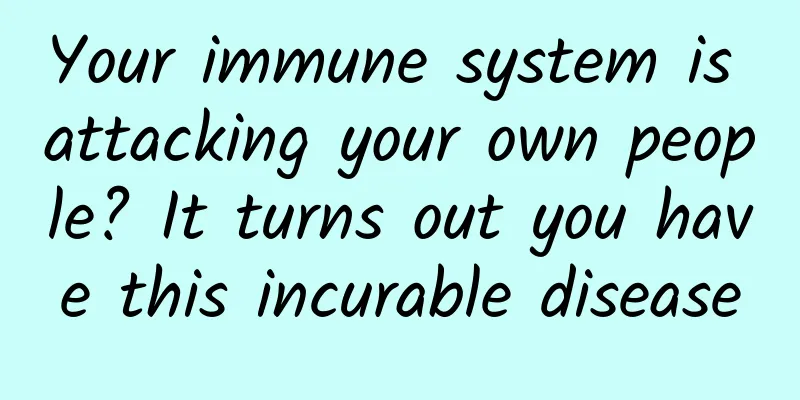Your immune system is attacking your own people? It turns out you have this incurable disease

|
- Introduction - During a physical examination at work, Agua was diagnosed with Hashimoto's thyroiditis . When he first heard about "inflammation", he thought it was nothing serious and that taking some anti-inflammatory drugs might help. But the doctor said that this is different from ordinary inflammation. It is an autoimmune system disease that requires special attention. Agua's condition is in the early stage. Since there are no obvious symptoms, he does not need to take medicine for the time being. After listening to the doctor's introduction, Agua was confused: What is an autoimmune system disease? Is there something wrong with my immunity? Why do I need to "pay special attention" but "don't need to take medicine"? Jia Baoyu (West Lake Omi) | Written by In the previous large family of thyroid diseases, we have not mentioned this term - autoimmune thyroid disease , Hashimoto's thyroiditis is one of them. 1 “When he gets ruthless, he even hits himself.” The immune system is like our body's security system. This security system consists of three major parts: immune organs, immune cells and immune active substances. Cartographies of the human immune system: West Lake Omi The security family is very large. For example, the immune cell department includes lymphocytes, monocytes, neutrophils, basophils, eosinophils, mast cells, platelets, etc. Members of each department need to perform their respective duties to protect our bodies. Some bad guys who want to enter the human body to "make trouble" are called antigens , which are all substances that can induce immune responses in the body. Every time antigens such as viruses and bacteria enter the human body, immune cells will detect them and sound the alarm, and the security family will send out corresponding antibodies to deal with them. How can the security family identify the various substances in the human body, whether they are enemies or friends? In fact, this is all due to the ability of immune cells. Immune cells are alert "sheriffs" who can identify foreign invading antigens. Of course, even such a powerful "sheriff" can make mistakes sometimes - once he misjudges the target of attack in the defense battle, he will mistakenly attack "his own people", which is what we call autoimmune diseases. Many diseases we are familiar with are autoimmune diseases, such as rheumatoid arthritis, systemic lupus erythematosus, hyperthyroidism, etc. The Hashimoto's thyroiditis we are going to introduce today is a typical case of the immune system "beating its own people", which is closely related to a type of immune cell in the security system - lymphocytes . 2 How does Hashimoto's thyroiditis come about? Hashimoto's thyroiditis, also known as "chronic lymphocytic thyroiditis", is an autoimmune disease caused by the thyroid gland being attacked by a series of cellular or antibody-mediated immune processes. An image of the thyroid gland of a patient with Hashimoto's thyroiditis under a low-power microscope. Source: wikipedia.org As we mentioned earlier, this disease is closely related to lymphocytes: the lymphocytes in the human body accidentally took the wrong path and ran into the middle of the thyroid epithelial follicular cells. The lymphocytes and follicular cells looked at each other in bewilderment - "Dude, who are you?" The lymphocytes take one look and think, “I don’t know this guy, he’s probably a foreign invader!” The lymphocytes, acting as “sheriff”, pick up their weapons (antibodies) without saying a word and rush forward to beat you up. As a result, the thyroid gland is attacked, and you, as the owner of the thyroid gland, inevitably suffer from Hashimoto’s thyroiditis. In other words, when the body's immune system goes "wrong" and produces antibodies that attack thyroid cells, treating them as foreign invaders, you develop Hashimoto's thyroiditis. When lymphocytes attack the epithelial follicular cells and enter the thyroid gland in large numbers, thyroglobulin ( Tg ) is dumbfounded - as soon as the immune cells see Tg, they directly produce thyroglobulin antibodies (TgAb) and chase Tg all the way. The unlucky little guy Tg is a glycoprotein produced by thyroid follicular cells and is an important substrate for the production of thyroid hormones (T3 and T4) . We can also simply understand Tg as the mother of T3 and T4, so when Tg is "accidentally killed" by immune cells, the production of T3 and T4 in our body will be greatly reduced. Thyroid hormone production and transport pathways Image source: my.clevelandclinic.org The process of Tg generating T3 and T4 also relies on the catalysis of an enzyme called thyroid peroxidase (TPO). When Tg was being hunted down by immune cells, TPO also failed to escape the fate of being "guilty by association" - immune cells did not recognize it either, so they immediately sent out peroxidase antibodies (TPOAb) to deal with it. This is a problem. Both Tg and TPO are being hunted down, and the thyroid cells suffer heavy casualties . This results in the brothers T3 and T4 that are free outside the thyroid gland being unable to return home. They have to become orphans, wandering around in the human body's blood and other organs. The increase of thyroid hormones T3 and T4 in the body can cause symptoms of hyperthyroidism , such as eating a lot, getting hungry quickly, and having a bad temper... Of course, this is only the first stage of Hashimoto's thyroiditis - the thyrotoxicosis stage . But the duration of the hyperthyroidism stage is relatively short. On the one hand, this is because the mother of T3 and T4, Tg, is eliminated in large quantities, resulting in a decrease in the production of T3 and T4; on the other hand, free T3 and T4 are gradually consumed in various organs of the human body. At this time, the human body will feel as if the disease has been cured and the symptoms of hyperthyroidism have disappeared. In fact, the disappearance of hyperthyroidism symptoms also means that you have entered the second stage of Hashimoto's thyroiditis - the stable period. Next, T3 and T4 will slowly start to decline, and you will enter the third stage of Hashimoto's thyroiditis - hypothyroidism . At this time, you may gradually develop symptoms such as chills, fatigue, slow heart rate, and loss of appetite. Hashimoto's thyroiditis may not cause any symptoms in the early stages, but as the disease progresses, some patients may eventually develop hypothyroidism. How should we deal with this disease that has a rather tortuous course? 3 Take medicine carefully and check more often We all know that Hashimoto's thyroiditis is caused by immune cells "beating their own people", but the reason why immune cells attack the human body has not yet been determined. However, there are some factors that are more likely to induce Hashimoto's thyroiditis, and we need to pay attention to them: Gender factors (women are about seven times more likely to develop the disease than men); Genetic factors (having a direct relative with Hashimoto's thyroiditis or other autoimmune diseases makes you more likely to develop it); Environmental triggers , such as infection, stress, or radiation exposure (stress causes changes in hormone levels, and people exposed to radiation are more susceptible); Iodine overdose (people who consume too much iodine are susceptible to this condition); Therefore, everyone should pay attention to regulation, avoid being too stressed, avoid consuming too much iodine, and avoid angering the "immune cells" in your body. What should you do if you unfortunately get this disease? In a word: test thyroid function more often and take medicine carefully. In addition, there are several key points for treating Hashimoto's thyroiditis that you need to pay attention to: First of all, everyone should understand that whether Hashimoto's thyroiditis needs treatment depends on whether your thyroid function is normal and whether you have the corresponding hyperthyroidism/hypothyroidism symptoms. So once you find that something is "wrong" with you, you must seek medical attention in time. You can consider doing thyroid function and ultrasound antibody tests, and then follow the doctor's advice and cooperate with the treatment. Secondly, if you have no symptoms at all and your thyroid function is normal, you don’t need to take any medicine and just have regular check-ups. Finally, everyone needs to pay attention to adjusting their diet according to their own conditions (hyperthyroidism or hypothyroidism) and eat more foods that can enhance immunity. As for whether or not to supplement iodine, it also depends on the doctor's diagnosis. Do not supplement it randomly! Generally speaking, Hashimoto's thyroiditis cannot be cured, and once you are sick, it will accompany you throughout your life. However, most patients will not have any clinical symptoms. If their thyroid function is normal, they do not need treatment and can be checked regularly. For some patients who have significant symptoms and need treatment, modern medicine can also make their life expectancy and quality of life the same as those of normal people. Therefore, this disease in which the immune system attacks its own immune system sounds scary, but is actually very "gentle". ➽ References: 1.McGee, Elizabeth A.; Hsueh, Aaron JW (2000). "Initial and Cyclic Recruitment of Ovarian Follicles". Endocrine Reviews. 21 (2): 200–214. doi:10.1210/edrv.21.2.0394. PMID 10782364. 2.Hashimoto's disease - Symptoms and causes - Mayo Clinic 3.Departments and Centers - Mayo Clinic 4.Hashimoto's Thyroiditis | American Thyroid Association 5.Hashimoto's Thyroiditis: Symptoms, Causes, and Treatments (webmd.com) 6. "It turns out that the thyroid gland is so important" edited by Peng Lin. Guangdong Science and Technology Press. |
<<: Yawning is contagious! When people yawn, do animals yawn too?
>>: How many steps are there to travel to Mars?
Recommend
Bullets are only nanometers in size! This may be the world's smallest shooting video game →
In a laboratory at Nagoya University in Japan, sc...
How to play with Tik Tok’s recommendation rules?
How to create a hit on Douyin? What are the six m...
Authoritative interview! Detailed explanation of COVID-19 symptoms within 7 days of onset! How to quickly turn from positive to negative? A picture comparison →
The following article is from Beijing News Radio,...
National Defense Science Popularization Gas Station (36) Supercontinuum Laser: An Extraordinary New Light Source
In the field of optics, laser has the characteris...
4 SEM promotion time strategies can increase your conversion rate by 5 times!
When it comes to bidding time periods, many compa...
"91 Ten Articles" - A daily must-read briefing for the new energy vehicle industry (210127)
1. Zhuhai State-owned Assets Supervision and Admi...
Taobao promotion: Taobao mobile search traffic rules
How is Taobao Mobile search traffic distributed? ...
Subsidy standards for rural village cadres over 60 years old in 2022: How much per month? Attached is the latest salary standard for village cadres!
In rural areas, village cadres are the leaders of ...
Why are bamboo shoots the cutest plants?
Am I cute? | Haragayato / Wikipedia Bamboo shoots...
Why is physics so powerful in creating new mathematics?
The development of physics in the 20th century be...
Lighthouse inheritance | Wu Mengchao: A doctor with a heart of compassion and a heart of bravery
He performed the first liver cancer middle lobect...
FastQuery: a framework for fast data operations
FastQuery fast operation data layer framework Fas...
5000 words of practical information: in-depth analysis of KOL operations from 0 to 1
What I talk about most with friends recently is K...
Google starts testing Android Q
Android 9.0, codenamed "Pie", was offic...
User-centric? Why not sit down and do an in-depth user interview?
"User-centric" is the consensus of Inte...









